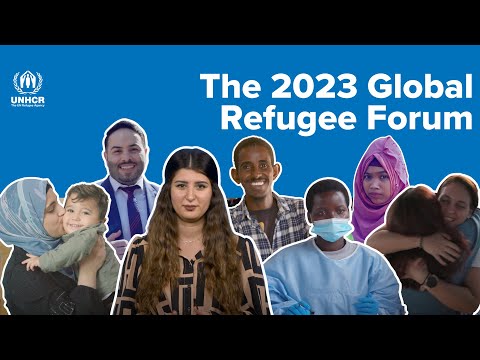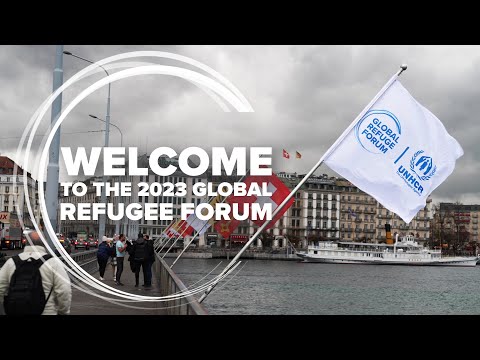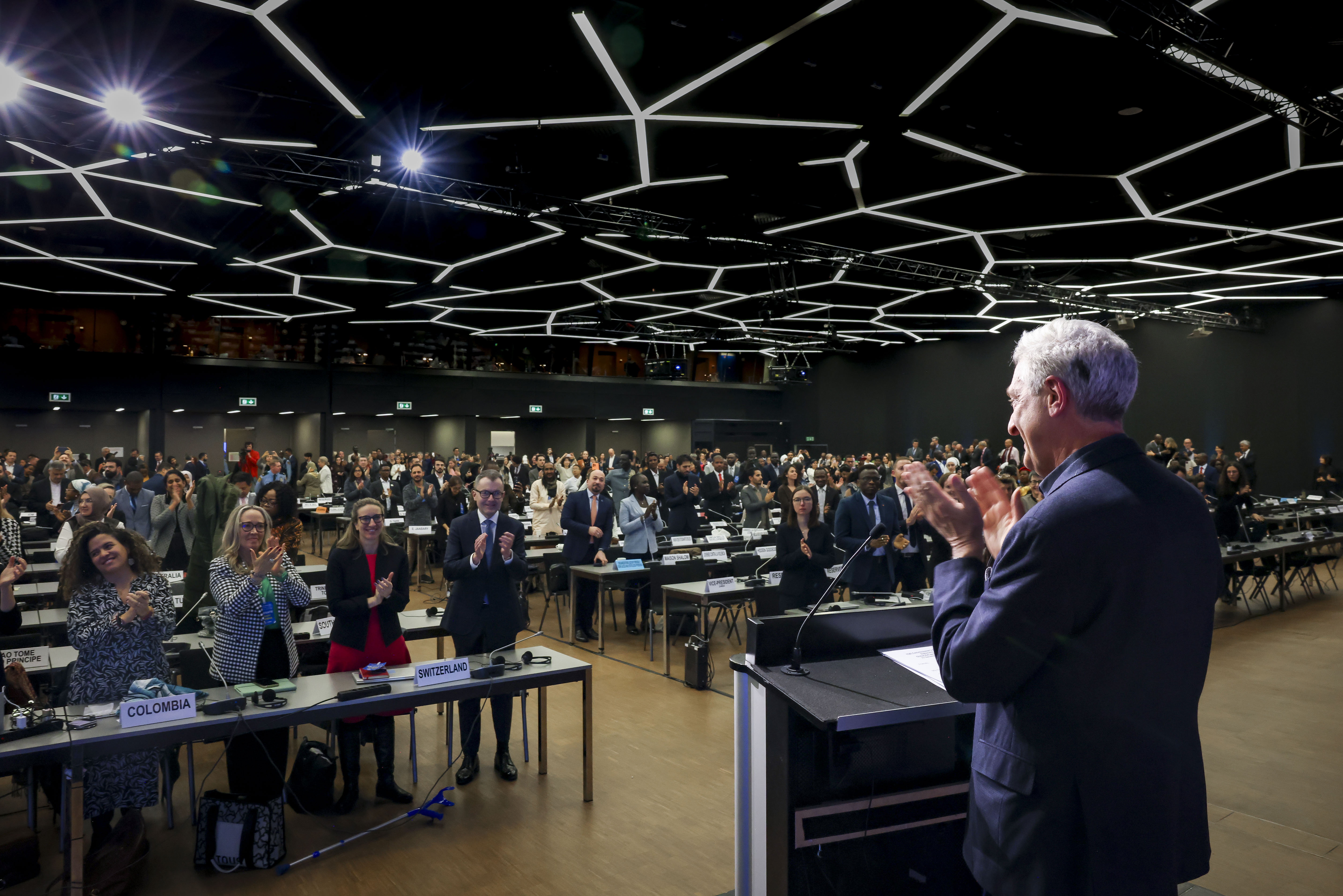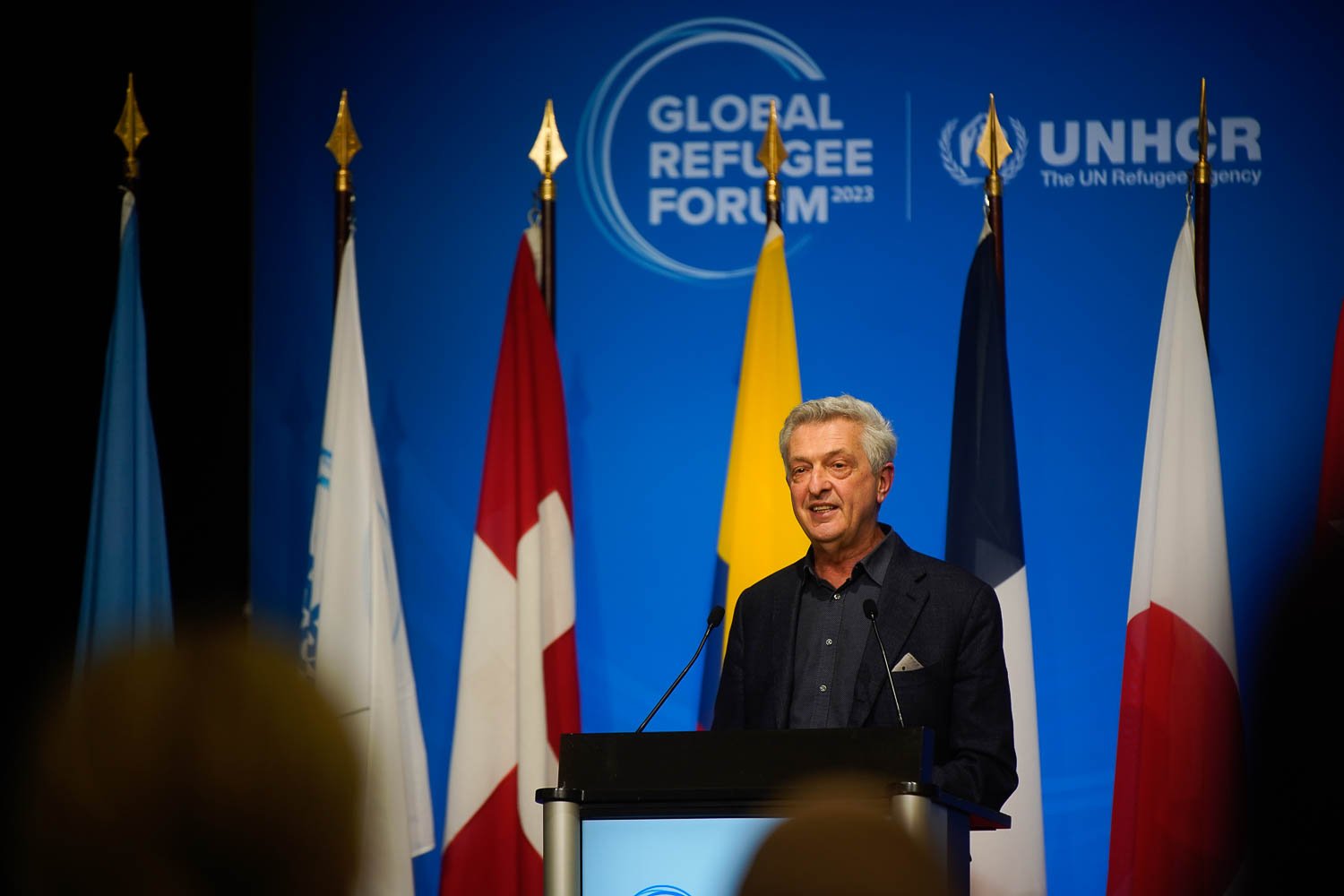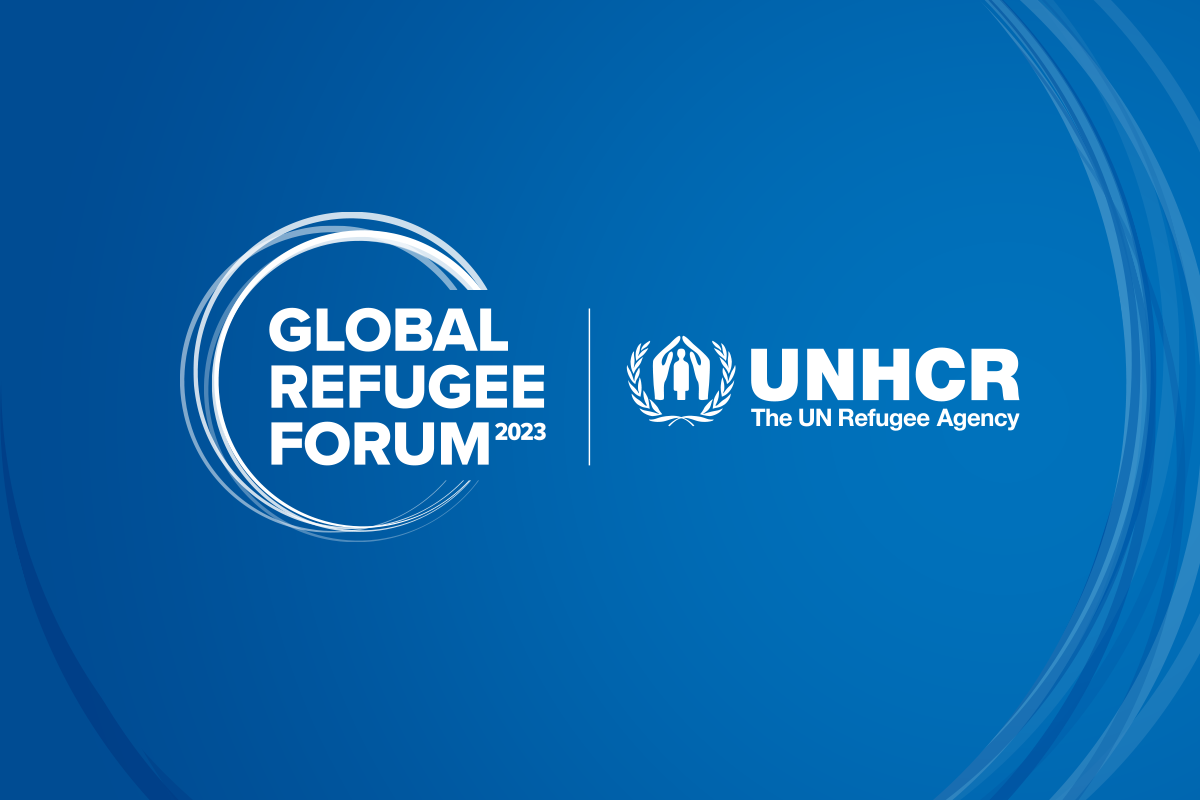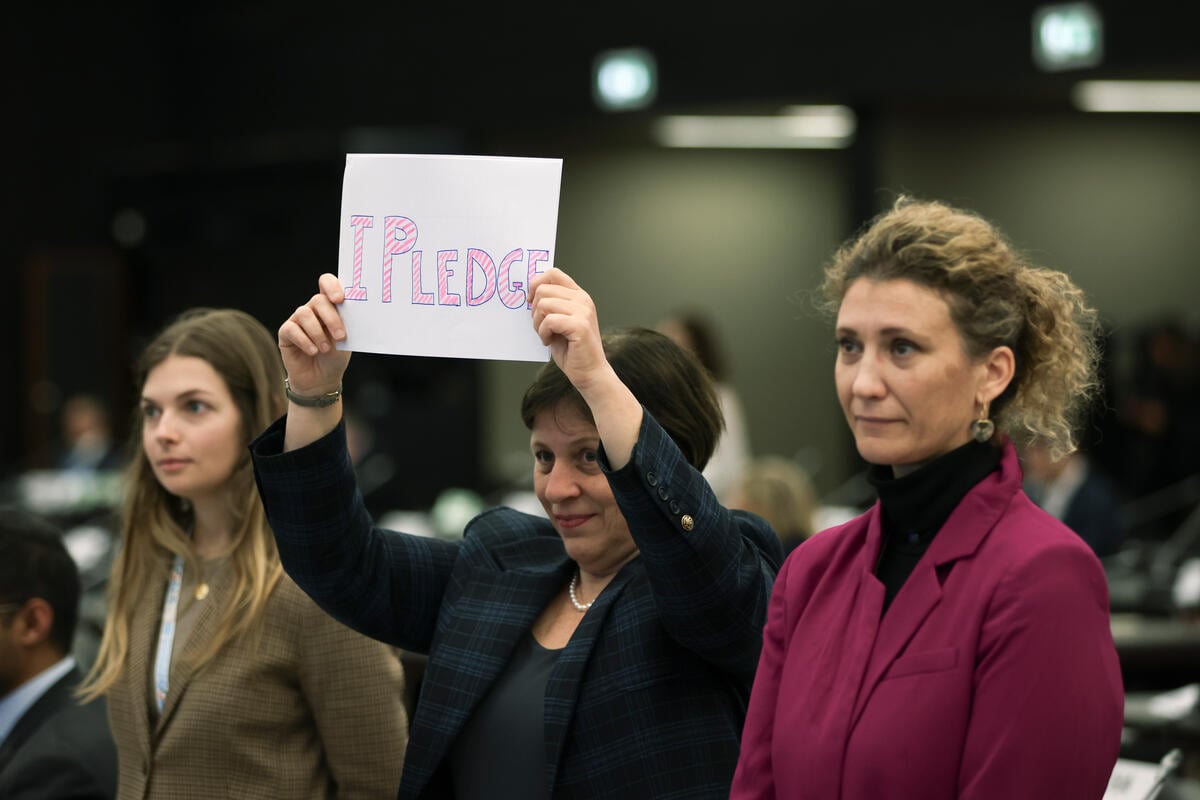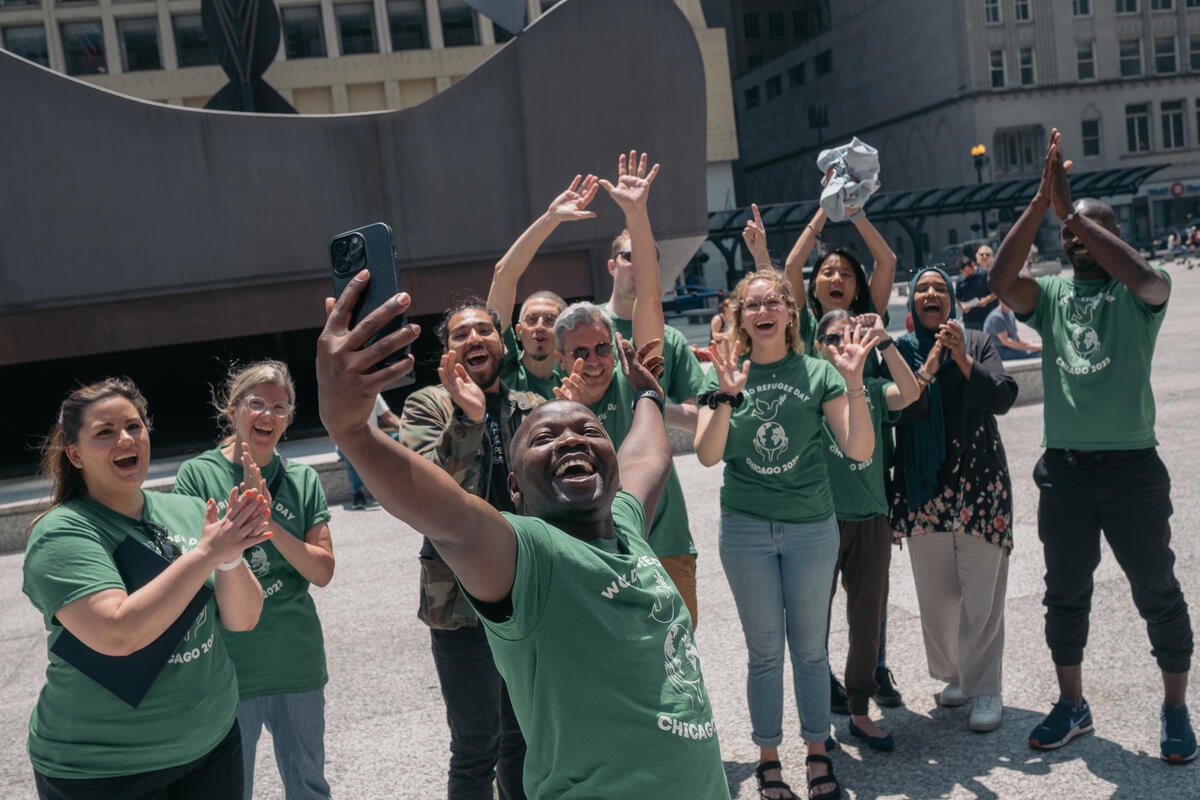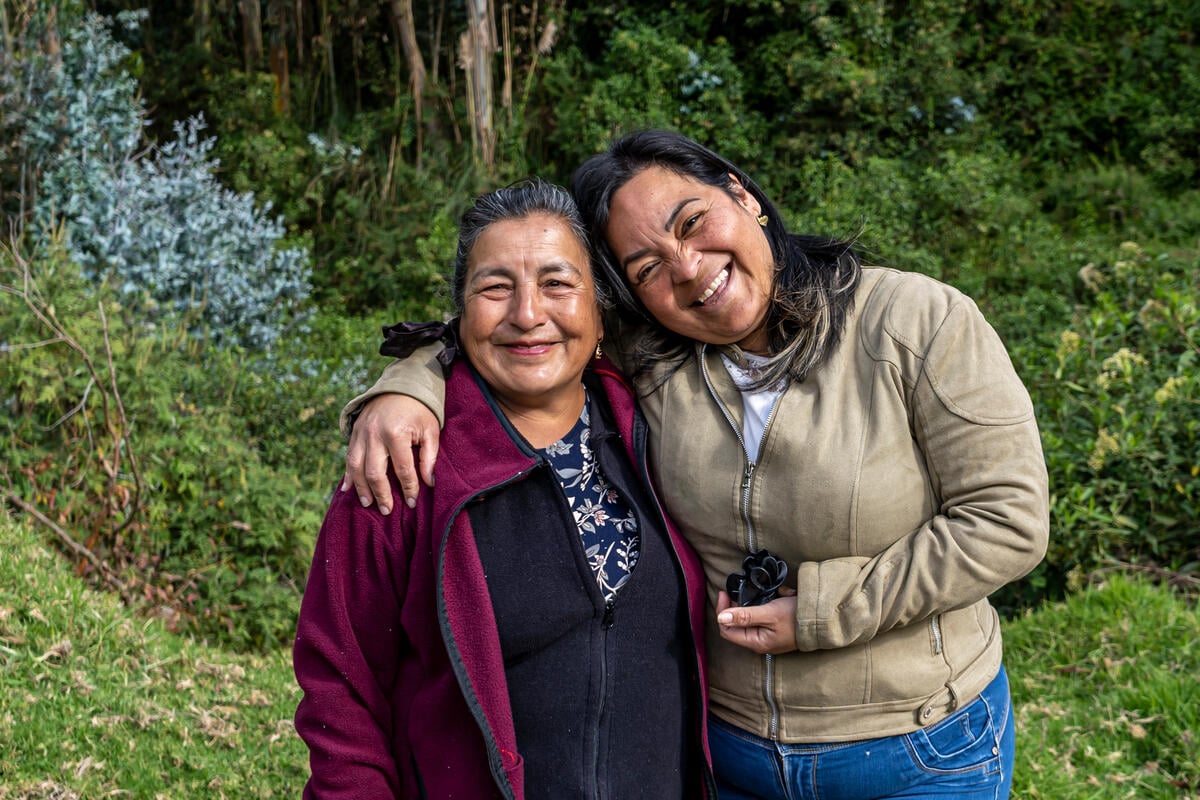Live blog: Global Refugee Forum 2023 – Day 1

Live blog: Global Refugee Forum 2023 – Day 1
Sudanese refugees celebrate Eid al-Adha with the local community at a UNHCR-supported displacement site at Korsi in the Central African Republic.
The Global Refugee Forum 2023 takes place from 13 to 15 December at the Palexpo in Geneva, Switzerland.
Held every four years, the Forum brings together decision-makers and stakeholders from around the globe – including refugees themselves – to find solutions and pledge action for the world's refugees and the countries and communities hosting them.
10.05 pm: End of Day 1

Abdullahi Mire, the 2023 Global Laureate, accepts the Nansen Refugee Award at a ceremony in Geneva.
The curtain has fallen on the Nansen Refugee Award ceremony, which celebrated inspiring stories of unsung heroes helping refugees and other displaced people, with rousing musical performances from a host of talented artists. Global Laureate and refugee education champion Abdullahi Mire accepted his award "on behalf of all refugee children whose greatest desire is to thrive".
That brings our coverage of Day 1 at the Global Refugee Forum 2023 to a close. Join us again tomorrow for updates from Day 2.
6.58 pm: Get ready for the Nansen Award ceremony

The 2023 Nansen Refugee Award winner, Abdullahi Mire, in one of the libraries he founded in Kenya’s Dadaab refugee complex.
The 2023 UNHCR Nansen Award ceremony is about to begin. The 2023 Global Laureate is Abdullahi Mire, a journalist and former refugee from Somalia who has championed the right to education while putting 100,000 books in the hands of displaced children and youth in Kenya. You can read (and view) more about “the Nansen”, one of the leading humanitarian prizes, on our website. And you can watch the ceremony live here!
6.06 pm: Preventing and resolving conflicts top priority for refugees and focus of new pledge
“Being an internally displaced person or a refugee is never a choice, rather it is a result of leaders using violence to forcefully solve their own issues rather than finding a peaceful solution that would not result in the displacement of citizens,” said Nyakuma Peter Gatksuoth Riak, a South Sudanese refugee living in Uganda, addressing a session this afternoon on peacebuilding and conflict prevention.
Riak founded “Together South Sudan”, a non-profit organization that aims to bring together South Sudanese tribes through reconciliation. “My passion has been bringing my divided people together, I have been providing voluntary trauma healing and reconciliation,” she said.
Armed conflict not only forces people to flee their countries, it also prevents them from returning home in safety and dignity – one of the main objectives of the Global Compact on Refugees. Preventing and resolving conflicts is therefore a top priority for refugees and the focus of a new pledge led by Colombia, Egypt, Norway and the UN Department of Political and Peacebuilding Affairs (DPPA).
“We want these territories that have suffered armed conflict for so long to be spaces for ‘the Good Life’, as we call it in Colombia,” said Francia Elena Márquez Mina, Vice President of the Republic of Colombia.
5.49 pm: Including refugees in national education systems

Felix Sesay speaks at an event on the inclusion of refugees in national education systems on the sidelines of the Global Refugee Forum.
“Let’s imagine a world where the ink of inclusive education writes the destiny of every child, regardless of our journeys,” said Felix Sesay, a refugee from Sierra Leone who studied nursing in Ghana, as he opened a side event this afternoon on the inclusion of refugees in national education systems.
Access to quality education is one of the best ways to ensure refugees can achieve self-reliance, contribute to their host countries, and lead productive lives once they return home. But shockingly, more than half of the world’s 15.5 million refugee children are not in school.
One of the speakers was Nyanen Malik, a teacher and youth sports facilitator in Kenya's Kakuma refugee camp. "Being a teacher is hard enough everywhere, but it is even harder in a refugee context," she said, reflecting on her time as a teacher in Kakuma where she taught 100 students in a single class with limited resources.
Malik believes that the primary role of refugee teachers is to instill hope in their students, as it is "the only thing that we cannot take away from any refugee child in the world."
Encouraging host governments to include refugees in national education systems is one of the aims of a new mega-pledge announced at the GRF by co-convenors including the World Bank, the Global Partnership for Education, Education Cannot Wait, Canada, Germany, the United Kingdom, UNHCR, and UNICEF.
5.17 pm: Uniting the UN to support refugee inclusion

Rez Gardi (middle), an international lawyer, human rights activist, and co-managing director of Refugees Seeking Equal Access at the Table (R-SEAT), speaking at the GRF.
“Inclusion into national systems isn't solely a matter of the present; it's an investment in a more promising future,” said Rez Gardi, a lawyer of Kurdish descent and co-managing director of R-SEAT (Refugees Seeking Equal Access at the Table), as she opened a packed side event this afternoon on the UN’s role in supporting refugee inclusion.
“By offering education, healthcare, and employment, host countries empower refugees to make positive contributions to their communities, enriching the social tapestry and fostering a more inclusive and tolerant society.”
At the GRF, 32 UN entities, 19 of which have made commitments at global level, stepped up their commitment to refugee inclusion under a UN common pledge 2.0 that builds on the achievements of a 2019 pledge. They agreed to support host countries’ efforts to include refugees in national systems such as health and education, and to boost refugees’ access to decent work.
Helena Fraser of the UN Development Coordination Office, one of the pledge co-leads, said: “We recognize the enormous generosity of host countries, and the incredible resilience of those who are forced to leave home – whether because of war, climate change, poverty or other reasons. Ours is a support role, and with this pledge, we are making ourselves accountable to delivering on that role, as one, as best we can, to improve the lives of 51.6 million vulnerable people on the move today.”
4.36 pm: Harnessing the power of sport for refugee inclusion

Litch Gatkoi, a refugee from South Sudan, plays basketball at Kauma refugee camp where he started his own team.
“I used sport to survive as a refugee and overcome trauma and connect with other refugee women, to create a sisterhood, a community where we could share and express our feelings and overcome challenges,” said Khalida Popal, former captain of the Afghan women’s national football team and Founder and Director of the Girl Power Foundation, speaking at a GRF session on the power of sport for inclusion.
The physical benefits of playing a sport are well known to anyone who’s kicked a ball or swung a racket. But for refugees, sport can offer much more – creating social ties in their new communities and providing a source of strength and purpose.
To harness these and other benefits, the Scort Foundation, the Olympic Refuge Foundation and UNHCR are leading a new multi-stakeholder pledge on sport for inclusion and protection. It brings together sports federations, governments, private sector actors and others offering resources and expertise to improve the lives of refugees and host communities through sport.
Gerald Mballe, who is now an advisor on the Special Olympics Unified with Refugees programme, described his difficult journey to safety from his native Cameroon and having lost all hope by the time he reached a refugee centre in Italy. “Sport became my salvation in the face of the challenges that come with being an unaccompanied minor in a new country."
4.33 pm: MADE51 House showcases work of refugee artisans
MADE51 was created by UNHCR in 2018 to create sustainable livelihoods for forcibly displaced people. A MADE51 “house” at the GRF features installation pieces and a pop-up shop showcasing the skills and craftmanship of refugee artisans.
4.08 pm: Speakers’ Corner provides a platform for experts
Away from the Plenary session and the Parallel High-Level Events, participants in the GRF have also taken to the lectern at Speakers’ Corner, a few steps away from the main assembly hall, to make a series of short talks on forced displacement issues. It’s a place for an array of experts – government representatives, UN personnel, academics, refugees, stateless people, humanitarians and others – to make 10-minutes speeches and/or presentations on their experiences, best practices, new approaches and strategies to tackle current and future challenges.
3.50 pm: UNWRA’s Lazzarini says Palestinian refugees need a solution, not just aid

Philippe Lazzarini, UNWRA Commissioner-General, addresses the Global Refugee Forum.
The Global Refugee Forum is taking place against the backdrop of conflict in Gaza, and Philippe Lazzarini, the Commissioner-General of UNRWA – the UN Relief and Works Agency for Palestinian Refugees – was invited to address the afternoon plenary session. He told delegates he had arrived in Geneva directly from Gaza, where he described conditions as “a living hell”.
“There is no more food to buy, even for those who can pay. In the shops, the shelves are empty,” he said. “Many of our staff, who are themselves displaced, take their children to work with them to ensure that they are safe together or die together.”
Lazzarini concluded by urging delegates to address the plight of millions of Palestinian refugees alongside those fleeing other global crises.
“Palestine refugees need a just solution, not just aid. Today, they feel abandoned by the international community,” he said. “The Global Refugee Forum represents the political will of the international community to affirm the human rights of all people fleeing wars and other crises, whether it is Syrian, Somali, Afghan or Palestinian,” he said.
UNHCR Goodwill Ambassadors call for solidarity with refugees
Ahead of this week’s Global Refugee Forum, our Goodwill Ambassadors, some of them refugees themselves, came together to send the message that everyone has a part to play in standing with refugees.
❌ We can’t overcome the world's challenges alone.
— UNHCR, the UN Refugee Agency (@Refugees) December 11, 2023
✊ We need to be on this journey together.
This week’s Global #RefugeeForum needs everyone involved to answer the challenge. Thank you to our wonderful Goodwill Ambassadors, some refugees themselves, for your solidarity. pic.twitter.com/ElzIGXcnDE
2.36 pm: Refugee students need not just access, but support to succeed
Hala Haj Taleb, UNHCR refugee journalism mentee reporting from Geneva
Hala Haj Taleb, UNHCR refugee journalism mentee reporting from Geneva
For refugees, the crucial importance of education spans from primary school to university, as emphasized by Jackson Byiringiro, a Congolese refugee with the Connected Learning in Crisis Consortium (CLCC) who lives in Rwanda. During a side event at the Global Refugee Forum discussing the future of refugee students worldwide, Byiringiro stressed that personalized support is essential for refugees to navigate education systems in a new country, especially in areas that lack infrastructure, such as internet, electricity, or access to electronic devices.
“Refugees need a lot more than just access,” he said, adding that after graduation, “universities should look beyond that and facilitate refugees’ access to employment pathways.”
2.32 pm: Transforming lives through education

Jackson Byiringiro from the Connected Learning in Crisis Consortium speaks at the Education Campus event on 12 December, 2023.
“I was deprived of an education ... I saw children going to school, and I wondered what was wrong with me,” said Nour Azizah, a Rohingya refugee from Myanmar, at an Education Campus event on the eve of the Global Refugee Forum.
Access to education is vitally important for refugees, offering dignity, opportunity and safety. When education is delayed – or denied altogether – the effects can be felt for a lifetime. Dozens of refugee delegates discussed developments and continuing challenges in access to education with academics, policymakers and others attending the campus on the eve of the GRF on Tuesday.
Nour’s family were granted asylum in Australia, where she was able to enrol in school for the first time.
“The experience of getting access to education was transformative, allowing me to rebuild my identity and embrace my Rohingya heritage. I stand here not as an exception, but as one of many talented Rohingya individuals,” she said.
UNHCR Head sits down with South Sudanese refugee and journalist Opira Bosco Okot
Ahead of the Forum, High Commissioner for Refugees Filippo Grandi talked to Opira Bosco Okot, a South Sudanese refugee and graduate of UNHCR’s refugee journalism programme, about some of the key goals of the GRF.
“Global challenges require global alliances.”
— UNHCR, the UN Refugee Agency (@Refugees) December 13, 2023
🔴 Watch this insightful conversation between UN High Commissioner for Refugees Filippo Grandi and UNHCR’s journalism programme mentee Opira Bosco Okot ahead of the Global #RefugeeForum. pic.twitter.com/P05v5btop5
12.24 pm: Refugee Advisory Board calls for participation of refugees in decision making

South Sudanese refugee Adhieu Achuil Dhieu.
Adhieu Achuil Dhieu, a South Sudanese refugee, delivered an impassioned statement on behalf of UNHCR’s Advisory Board of Displaced and Stateless Persons, calling on world leaders to put displaced people at the forefront of decision-making processes.
She said there must be a “tangible change led by displaced and stateless persons, to secure our rightful place in the decision-making processes that impact our lives.”
She noted that while there has been increased participation of displaced people in strategic dialogues and development of global policies since the first Global Refugee Forum in 2019, there was still a “considerable distance to go before we realize genuine refugee leadership.”
She also made an urgent call for increased funding for refugee-led organizations and reminded leaders that the displacement crisis is a shared responsibility.
“Displacement is a temporary challenge, not a permanent condition,” she concluded.
11.59 am: Japan’s Foreign Affairs Minister urges longer-term approaches to forced displacement

Kamikawa Yoko, Japan’s Minister for Foreign Affairs, speaks at the opening plenary.
Kamikawa Yoko, Minister of Foreign Affairs for Japan, another co-convenor of the Forum, expressed her conviction that it was time to take a more forward-looking approach to forced displacement.
“We can’t improve the situation merely by providing food, water and shelter,” she said. “I believe we all must envision a future where every refugee and displaced person can talk about their dreams and have opportunities to work hard to make their dreams come true.”
She described some of the programmes around that world that Japan supports to help refugees – women in particular – to become more independent through education and vocational training. “We strongly encourage them to develop their abilities so they can contribute to peace and reconstruction at home,” she said.
She concluded by emphasizing the urgent need for conflict resolution. “UNHCR can help save people’s lives and ease some of their suffering, but it cannot resolve conflict. [That] is the responsibility of politicians such as myself, and many others here today.”
11.45 am: French minister pledges to work on joint solutions

Catherine Colonna, France's Minister for Europe and Foreign Affairs, speaks at the opening plenary.
France’s Minister for Europe and Foreign Affairs, Catherine Colonna, issued a strong appeal for more support to the countries neighbouring conflicts who host most refugees, saying they “must be able to host them in dignity.”
“Dignified hosting means not only finding shelter, but also access to education, to training, employment. For host countries, we know this is a challenge, a challenge that we need to rise to.”
The minister promised France would take up the challenge of working with refugees and others to find solutions. “We will make sure that this Forum is a place where we work … to take action for humanity, for all those who need it – alongside them.”
11.31 am: Host countries should not be left alone to shoulder refugees’ needs, says Uganda’s Prime Minister

Ugandan Prime Minister Robinah Nabbanja is greeted by UN High Commissioner for Refugees Filippo Grandi at the Global Refugee Forum 2023.
Robinah Nabbanja, the Ugandan prime minister, noted that Uganda had gone from being a major refugee country of origin in the 1980s to today having the fourth-largest refugee population globally and being host to refugees from South Sudan, the Democratic Republic of the Congo, Somalia, Burundi and elsewhere.
“These are our African brothers and sisters, who find themselves victims of sectarian conflicts. Accepting African refugees is part of [our] solidarity with our African brothers and sisters,” she said.
However, she added that “enormous strain has been placed on our meagre economic resources… Refugees come with critical needs that must be addressed by all concerned stakeholders. They should not be left to host countries.”
She called for more efforts to uphold the humanitarian rights of refugees – “efforts that prioritise humanity over politics, compassion over indifference.”
11:12 am: Colombia's Vice President calls for greater responsibility sharing

Francia Elena Márquez Mina, Vice President of Colombia, speaks at the opening plenary of the Global Refugee Forum 2023.
Francia Elena Márquez Mina, Vice President of Colombia, one of the co-convenors of the Forum, expressed her country’s ongoing commitment to addressing forced displacement. She noted that Colombia has the largest number of internally displaced people in the world – 6.9 million – due to internal armed conflict. She described her own experience of having to flee her home with her two children because her environmental work had made her a target for armed groups.
“Culturally speaking, Colombians are very much rooted to our land, this means that uprooting us not only affects us physically, but also spiritually and emotionally. This constitutes chronic suffering,” she said.
She noted that Colombia is also host to some 3 million Venezuelans, 2 million of which have benefited from a special migratory status that ensures they can access education, healthcare and other services. In addition, she added, “We face a migration crisis in the Darien Corridor [between Colombia and Panama] where 500,000 have crossed this year, from 100 nationalities.”
She called for more resources and shared responsibility to help Colombia grapple with the situation.
10.36 am: King of Jordan warns of waning attention for refugees

HM King Abdullah II of Jordan delivers the keynote address at the GRF 2023 in Geneva.
In his keynote speech, HM King Abdullah II of Jordan emphasized the need for sustained global support for countries hosting refugees, warning of the risk of “leaving a lost generation behind” if the needs of refugees and their hosts are ignored.
“Instead of making headway in resolving this ever-evolving and expanding refugee crisis – and even as new displacement crises emerge – we see attention waning. We cannot afford for this to continue,” he said.
The King cited the example of his own country, which hosts 1.4 million Syrians including 650,000 refugees registered with UNHCR who fled their country’s crisis. He contrasted Jordan’s efforts to include refugees in national services and provide long-term solutions with the fluctuating support of global donors.
“We recognize that this is a long-term commitment that we are undertaking on behalf of the international community. Likewise, the international community cannot resort to short-term solutions and move on to the next crisis.”
He concluded by encouraging delegates to deliver tangible results at the Forum: "Our global community cannot thrive if its most vulnerable are left behind. Let’s make this forum count.”
10.32 am: UNHCR’s Grandi makes opening speech
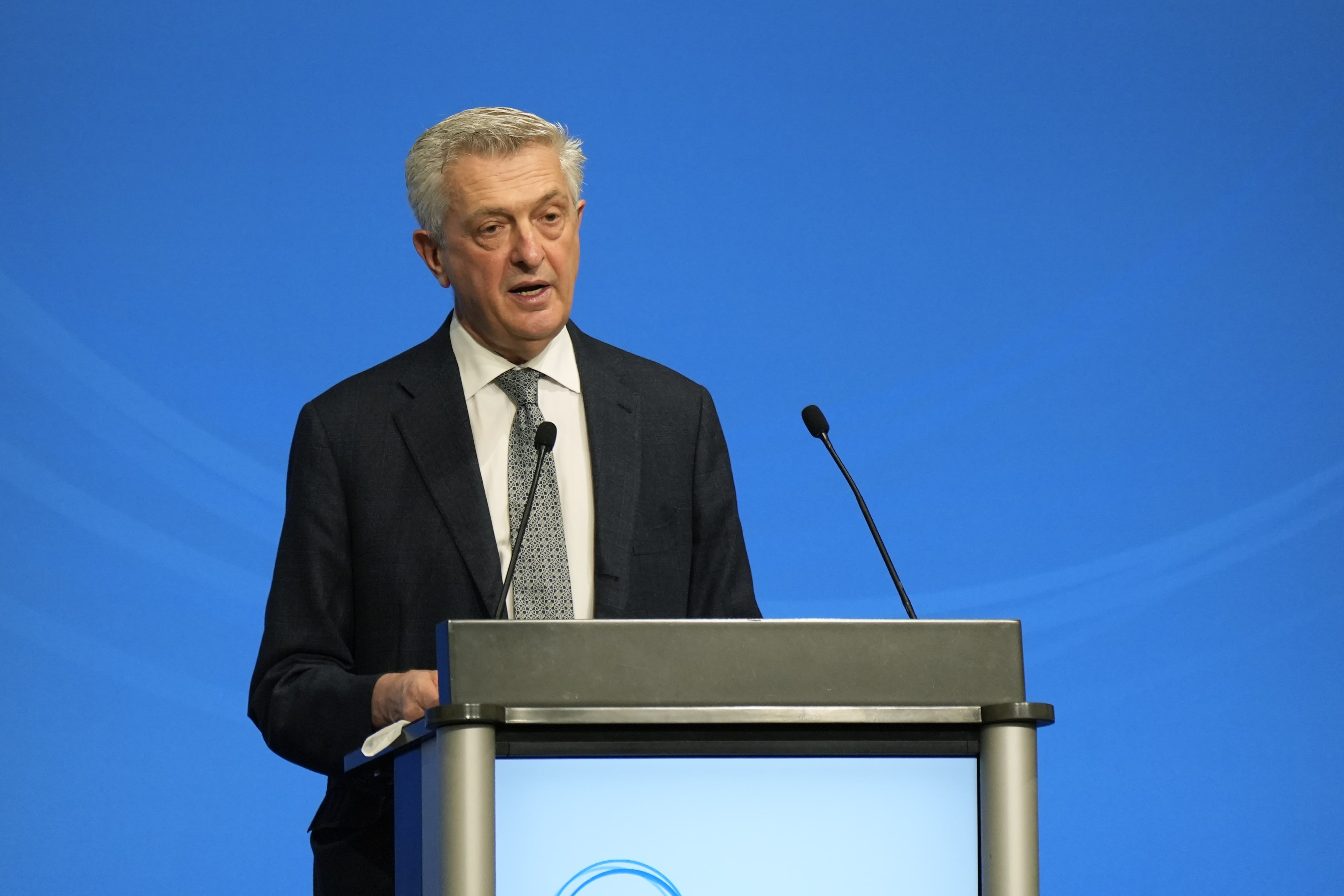
UN High Commissioner for Refugees Filippo Grandi delivers opening statement and the Global Refugee Forum 2023.
In his opening statement to the Forum, UN High Commissioner for Refugees Filippo Grandi pointed to the fact that 114 million people worldwide are now forcibly displaced – including 36.4 million refugees – a figure he described as “a crisis of humanity".
“This is why this Global Refugee Forum is timely: because it is an opportunity for all of us to re-commit to some basic actions needed to respond to forced displacement: protecting people forced to flee, and sharing the responsibility of those who host them; ensuring that refugees are empowered to contribute to communities and nations that give them refuge; redoubling efforts to resolve their exile; and striving to tackle the root causes of their flight,” Grandi said.
Despite numerous unresolved crises and challenges around the world, the High Commissioner noted that much progress has been made since the first Forum in 2019 and expressed his hope that the second GRF would spur further cooperation.
“Let us make this Global Refugee Forum a moment of unity, in which all of us join forces to ensure that those who flee because their life, freedom and security are threatened can find protection; and that everything is done to resolve their exile as soon as possible,” he said.
9.54 am: Co-host Switzerland welcomes delegates

Switzerland's State Secretary for Migration, Christine Schraner Burgener, speaks at the Global Refugee Forum 2023.
After introductory remarks by Filippo Grandi, UN High Commissioner for Refugees, Christine Schraner Burgener, Switzerland’s State Secretary for Migration, took the floor to welcome delegates – Switzerland is co-hosting the Global Refugee Forum along with UNHCR.
Remarking that the 1951 Refugee Convention was signed in Geneva, she noted that the number of people seeking international protection across the world continued to rise as the world faced “a multiplication of crises and instability”. This was “catastrophic” for the people and regions directly affected and posed major challenges for the international community.
“These challenges can only be met if all stakeholders, public and private, take on their role in hosting and caring for these people,” Schraner Burgener said. “It is high time to strengthen international cooperation and broaden the support base – the financial base in particular.”
She called the GRF “a unique opportunity” to face up to the challenges of displacement and to create lasting and effective partnerships. “We hope the spirit of cooperation will triumph over the next three days.”
8.05 am: Oscar-winning actors Cate Blanchett and Ke Huy Quan perform poem “Refuge”
The Global Refugee Forum opened with a moving performance of JJ Bola’s poem “Refuge” by actor and UNHCR Goodwill Ambassador Cate Blanchett and Ke Huy Quan, an actor and former refugee.
“Imagine how it feels to be chased out of home.”
— UNHCR, the UN Refugee Agency (@Refugees) December 13, 2023
📢 UNHCR Goodwill Ambassador Cate Blanchett and Ke Huy Quan just opened the Global #RefugeeForum with a performance of @JJ_Bola’s stunning poem “Refuge.” pic.twitter.com/Sem5BTW8tb
8.00 am: Delegates and dignitaries arrive ahead of the opening plenary session
Delegates are arriving at the Palexpo congress centre ahead of the opening plenary session.
7.50 am: What is the GRF?
The Global Refugee Forum is the world’s largest gathering on refugee issues, but why is it happening now and what does it hope to achieve?
To find out, read our handy explainer article and watch the video below:
You can also read this opinion article by UN High Commissioner for Refugees Filippo Grandi, setting out his vision for the Forum as a moment of global unity at a time of multiple conflicts and record forced displacement.
For a deeper look at the issues at stake, read our GRF coverage on themes such as employment, qualifications, legal aid, inclusion, climate action and the role of the private sector.
7.16 am: Follow along where you are
You don’t have to miss out if you’re not attending the GRF in person.
Segments of the plenary sessions will be livestreamed on UNTV Broadcast and selected high-level events will also be live-streamed here. This year’s UNHCR Nansen Refugee Award Ceremony will also be live-streamed from 19:00 on 13 December.
Subscribe to the Global Compact on Refugees newsletter to receive a video wrap-up summarizing key moments from the day.
Keep an eye out also for the recaps that will be posted to UNHCR’s social media accounts at the end of each day.
And, of course, keep checking the blog over the next three days for live updates from the Forum.
7.04 am: Coming up on Day 1
Here are the highlights to look out for on the first day (all times in CET):
- Opening plenary session (from 09:10) – opening remarks from co-hosts UNHCR and Switzerland and the five co-convenors – Colombia, France, Japan, Jordan and Uganda – followed by a joint refugee statement and high-level pledge announcements.
- High-level side events (13:30-15:00) – panel discussions on topics including entrepreneurship and employment, refugee education, and solutions in Central America and Mexico.
- UN High Commissioner for Refugees Filippo Grandi’s news conference (14:30 pm)
- Afternoon plenary session (from 15:00) – high-level interventions from national delegations and further pledge announcements.
- UNHCR Nansen Refugee Award ceremony (from 19:00) – showcasing this year’s award winners and featuring live musical performances.
You can view the full programme here.
6.00 am: Welcome to the GRF 2023!
Hello and welcome to live coverage of Day 1 of the Global Refugee Forum 2023.
Among those gathered in Geneva for the opening day are world leaders, ministers, UN and government officials, city mayors, representatives of development banks, businesses, charities and foundations, faith-based groups, students and more than 300 refugee delegates from around the world.
Check back here throughout the day for updates on all the major developments.














